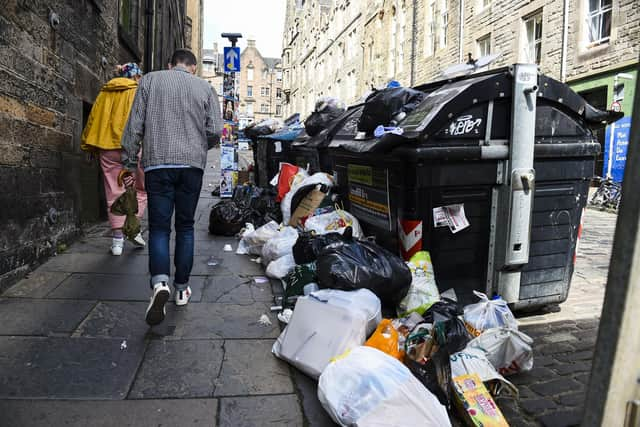Edinburgh bin strikes: Rubbish piling up on streets 'deeply concerning', says John Swinney
The Deputy First Minister spoke out as unions warned the dispute over local government pay, which saw cleansing staff in the capital walk out on strike last week, could become a "winter of discontent".
Refuse workers in Edinburgh have been out on strike since August 18, coinciding with the busy summer festival period.


Advertisement
Hide AdAdvertisement
Hide AdBut the action has now escalated, with waste workers in 13 other local authorities, including Glasgow, Dundee and Aberdeen, joining the protest. Schools in some areas could be forced to close next month if staff there join the walkout.
Appearing at an event at the Edinburgh Fringe, First Minister Nicola Sturgeon highlighted the Scottish Government’s budget limitations as industrial unrest grows.
She said there was a “real case” for civic mobilisation as she urged UK ministers to make a “large scale intervention” on the cost-of-living crisis.
Mr Swinney is understood to have held talks with Cosla, the council umbrella body, on Wednesday.


Asked about the impact of the strike in Edinburgh, he said: "I think the condition of the city of Edinburgh just now is deeply concerning on a host of levels, not least in relation to public health.
"So I acknowledge the significance of the issue, which is why I want to see the industrial action resolved, why I would prefer it didn't spread to other parts of the country."
He stressed the Scottish Government had already provided £140 million to councils, with this cash helping to fund an improved offer of 5 per cent.
Cosla said this was one of the best offers in decades.
However, Wendy Dunsmore, of Unite, said it needed to match the £1,925 pay rise being given to local government workers in the rest of the UK.
Advertisement
Hide AdAdvertisement
Hide AdShe told BBC Radio Scotland: "Our first wave was in Edinburgh, the second wave is waste across Scotland, our third wave is going to be schools.
"And it may not stop at schools, we're in here for the long haul."
She added: "Our members are demanding a better pay rise, and who knows where we are going to go next?
"We're looking for a winter of discontent, even though we're just approaching autumn."
Ms Sturgeon previously made clear the Government does not have a "bottomless pit of money" to resolve the dispute.
But Ms Dunsmore insisted ministers needed to find more cash.
She said: "We don't want strikes, but it is down to the Scottish Government to stop these strikes.
"There is an impact, but that's not an impact because of the workers, that's because there is a shortage of funding to the Scottish local authorities. This lands at the Scottish Government."
Advertisement
Hide AdAdvertisement
Hide AdUnions Unison and the GMB have said their members will walk out between September 6 and 8 – a move that will see schools, early years centres and nurseries disrupted in Aberdeenshire, East Renfrewshire, Glasgow City, Inverclyde, Orkney, North Lanarkshire, South Lanarkshire and Stirling.
Ms Sturgeon said she would love to be able to offer pay rises in line with inflation.
Making her third guest appearance at the Fringe, where she took part in an on-stage conversation with the journalist Graham Spiers, Ms Sturgeon was asked by an NHS worker in the audience whether she would support a potential healthcare strike.
NHS Scotland staff, including nurses and midwives, have said they are prepared to take industrial action after rejecting a 5 per cent pay offer.
Ms Sturgeon said she “totally understands why workers are campaigning and seeking to negotiate deals” that reflect the rise in inflation.
But she added: “Equally, as First Minister, I’ve got to balance our budget every year and I literally have to do that because we don’t have the borrowing powers that the Chancellor had and the Treasury, and that is difficult.
“I would love to be able to offer pay rises that were in line with inflation. I just can’t do that within our budget.
“So we’re trying to be as fair as we can within those constraints. These negotiations are ongoing and we will bust a gut to try and avoid industrial action in our health service and everywhere else, but I don’t pretend these are easy times for anybody.”
Advertisement
Hide AdAdvertisement
Hide AdMs Sturgeon previously urged the UK Government to freeze planned energy price hikes to avoid “destitution” across the country.
She told the Fringe audience: “People are going to be utterly swamped by this and lives will be lost.
“The big levers that can be pulled here, unfortunately – and I wish it were different – do not lie with us. They lie with whoever is the incoming prime minister.
“It will be unconscionable if there is not that significant action taken.”
She added: “I think as a country we have got to try and come together to demand that those who do have the powers to grow the overall resource available, take those decisions.
“I think there is a real case for that kind of democratic civic mobilisation of opinion right now. It is really, really needed.”
Councillor Katie Hagmann, Cosla’s resources spokeswoman, said: “The reality of this new offer is that the lowest paid 12 per cent of our workforce will get more than a 5 per cent increase, meaning that those on the Scottish local government living wage will see an overall 7.36 per cent increase.
"This amounts to one of, if not the best, offer in decades for Scottish local government workers during some of the most trying times for councils to continue to deliver the everyday essential services that our communities rely on.
Advertisement
Hide AdAdvertisement
Hide Ad“It is an offer made in good faith, which as far as we can in the current circumstances, tries to ensure that our lowest-paid workers are protected from the cost-of-living crisis, raising the minimum hourly rate for the lowest paid within the workforce to £10.50 per hour.”
Comments
Want to join the conversation? Please or to comment on this article.
